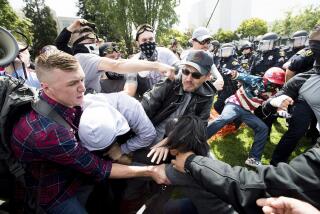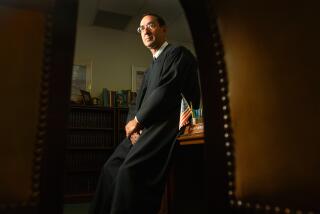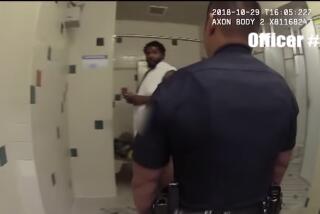Judge Real Balks at Order Taking Him Off Sears Case
- Share via
Los Angeles’ chief federal judge, reversed for the third time by an appeals court in a case involving criminal charges against Sears, Roebuck & Co., was ordered off the case Tuesday “for the judge’s sake and the appearance of justice.”
However, Judge Manuel L. Real, reached at a judicial conference in Monterey late Tuesday, openly defied the appellate court, saying there is no legal basis for a district court judge to abide by such a ruling.
“I don’t believe I will let go of the case,” Real said. “It interferes with the independence of the judiciary.”
He added that any move to take him off the case of necessity would have to be presented in his courtroom as a motion by government lawyers and it would be up to him to rule on such a motion.
A three-judge panel of the 9th U.S. Circuit Court of Appeals took the unusual action of removing Real from the case, which charges that Chicago-based Sears conspired to defraud the U.S. government by overstating on customs documents the price it paid for Japanese-built television sets over a period of several years.
Ordinarily, federal cases reversed on appeal are remanded to the original trial judge for consideration.
“But, on rare occasions, both for the judge’s sake and the interest of justice, an assignment to a different judge is desirable,” the appellate ruling said.
Sears, the nation’s largest retailer, was accused of concealing more than $1.1 million in rebates and credits that it had privately arranged with its suppliers in Japan in order to avoid certain duties imposed by U.S. authorities on certain foreign merchandise sold in this country for prices below those charged in their home market.
Real dismissed the federal charges against Sears for the first time in 1981, condemning the conduct of federal prosecutors, who reportedly badgered witnesses in questioning before the federal grand jury that returned the indictment against the retailer in 1980.
After the 9th Circuit reversed him the first time, Real continued to rail against federal prosecutors when he dismissed the case a second time in 1983.
“I think this is one of the most egregious cases I have ever, ever known about in my career as a lawyer,” Real said at the time. “I think . . . if I had been the U.S. attorney at that time, I would have fired (the original prosecutor) on the spot. . . .”
Reversed a second time, Real dismissed the case yet again, ruling that an amended indictment against Sears went far beyond the original 1980 charges in violation of the five-year statute of limitations.
Amended Charges
However, the 9th Circuit panel, comprised of 9th Circuit Judges Otto R. Skopil and William Canby and U.S. Senior District Judge Gus J. Solomon of Portland, Ore., ruled Tuesday that the amended charges against Sears were not in violation of the statute.
The eight-page opinion then went on to explain why Real was being removed:
“This is the fourth pretrial appeal in this case, and the third time the government has appealed from dismissal of the indictment. Even before trial, this case has consumed a tremendous amount of this court’s judicial resources and time.
“This court’s orderly administration of its own docket is threatened by the exertion of effort and the expenditure of time on repeated pretrial appeals in one case. The district judge’s (Real’s) statements and conduct evidence an appearance of his unwillingness to preside in this case.”
Softened Criticism
At another point in the opinion, the appellate judges softened their criticism of Real:
“The remand does not imply any personal grievance against the judge.”
Real, a former federal prosecutor himself, has the highest reversal rate--37%--among jurists in Los Angeles federal court, according to U.S. District Court figures.
More to Read
Inside the business of entertainment
The Wide Shot brings you news, analysis and insights on everything from streaming wars to production — and what it all means for the future.
You may occasionally receive promotional content from the Los Angeles Times.










